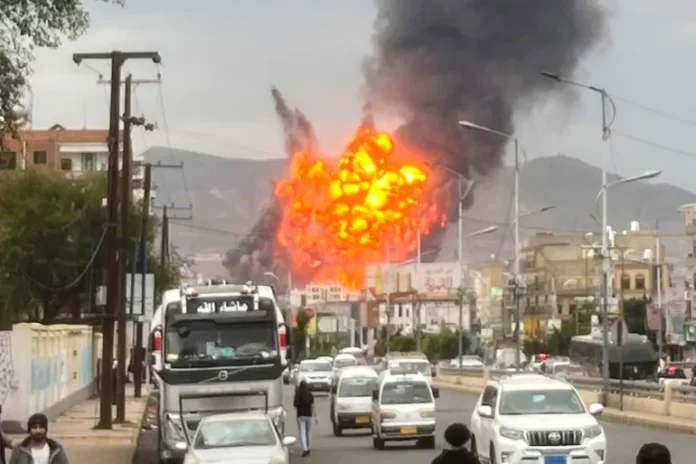Continued Escalation in Regional Conflict
Israel has intensified its military operations in the Middle East, carrying out fresh air strikes on Houthi positions in Yemen just a day after targeting senior Hamas figures in Qatar. The Israeli Defense Forces (IDF) confirmed that fighter jets struck military facilities in the Yemeni capital, Sanaa, as well as in the northern province of Al-Jawf.
According to Israeli officials, the targets included weapons depots and command centers operated by the Iran-aligned Houthi movement, which has previously launched drones and missiles towards Israel.
Houthi media outlets reported multiple casualties, though exact figures remain unclear. Local sources in Sanaa described thick plumes of smoke rising above residential neighborhoods, raising fears of civilian deaths. Independent verification of the casualty toll has not yet been possible.
Israel Defends Its Military Actions

Israeli Prime Minister Benjamin Netanyahu defended the strikes, insisting that they were both “measured” and “fully justified” in response to what Israel views as escalating threats from militant groups across the region.
“The Houthis, like Hamas and Hezbollah, are part of the same network of terror directed and armed by Iran,” Netanyahu said in a televised statement. “Israel will defend itself wherever necessary.”
The IDF said the Yemeni strikes were intended to disrupt the Houthis’ ability to launch long-range drones and missiles, which have been used in previous attacks against Israeli cities and shipping routes in the Red Sea.
Hamas Claims Casualties in Qatar Strike
The strikes in Yemen came less than 24 hours after Israel launched an unprecedented attack in Qatar, aimed at senior Hamas leaders allegedly involved in orchestrating the October 7, 2023 assault on southern Israel.
Hamas officials claimed that six people were killed in the Doha attack but insisted none of its top leadership figures were among the dead. “This was a criminal aggression and a violation of Qatar’s sovereignty,” a Hamas spokesperson said.
Israel, however, asserted that the strike specifically targeted senior members of the Hamas political bureau, accusing them of planning further operations. “Those who plot terror against Israeli civilians will find no safe haven,” Netanyahu stated.
Qatar Condemns Strike, Accuses Israel of Breaching International Law

The Qatari government reacted sharply to the incident, summoning Israeli envoys and accusing Tel Aviv of violating international law. Officials in Doha signaled their intention to pursue diplomatic and legal measures against Israel.
“Yesterday’s attack represents a flagrant breach of sovereignty and international norms,” the Qatari Foreign Ministry said. “Israel must be held accountable.”
Qatar has historically played a mediating role in conflicts between Israel and Hamas, facilitating ceasefire negotiations and humanitarian aid deliveries to Gaza. Analysts say the strike may jeopardize those channels and further destabilize diplomatic relations in the Gulf.
Diplomatic Fallout in London
The escalating regional crisis coincides with an awkward diplomatic moment in London. Israeli President Isaac Herzog met UK Prime Minister Keir Starmer at 10 Downing Street on Thursday. The talks were expected to focus on regional security and humanitarian issues, but tensions surrounding Israel’s recent actions cast a shadow over the visit.
Caroline Hawley, the BBC’s diplomatic correspondent, described the meeting as “extremely uncomfortable,” noting that the UK government has previously expressed concerns about the humanitarian consequences of Israeli military operations.
Starmer has called for restraint in the Middle East and urged all sides to prioritize civilian protection. Observers believe he is likely to press Herzog on the growing death toll in Gaza and now in Yemen.
Broader Regional Implications
Israel’s back-to-back strikes in Qatar and Yemen highlight the widening scope of the conflict beyond Gaza and southern Lebanon, where Hezbollah has also been engaged in clashes with Israeli forces.
Experts warn that the targeting of Hamas officials on Qatari soil could drag additional Gulf states into the conflict, eroding regional stability. “Israel has essentially opened a new front by striking in Qatar,” said Dr. Lina Khatib, a Middle East security analyst. “This risks transforming the Gaza war into a wider regional confrontation.”
Meanwhile, the Houthis have vowed retaliation for the attacks in Yemen, with military spokesperson Yahya Saree declaring that “our forces will respond at a time and place of our choosing.”
Uncertain Path Ahead
As the conflict continues to expand, questions remain about how far Israel is willing to extend its military campaign. Netanyahu’s government faces mounting international criticism, even from allies, while balancing domestic pressure to guarantee Israeli security.
With Qatar, Yemen, and the United Kingdom now drawn into the diplomatic and military fallout, the Middle East appears to be entering a new and unpredictable phase of instability.
For ordinary civilians across the region, the fear is that the conflict will continue to spill across borders, with devastating humanitarian consequences.
Sources: BBC

